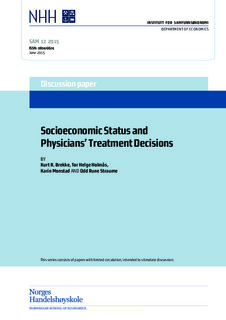| dc.description.abstract | This paper aims at shedding light on the social gradient by studying the relationship
between socioeconomic status (SES) and provision of health care. Using administrative data
on services provided by General Practitioners (GPs) in Norway over a five year period (2008-
12), we analyse the quantity, composition and value of services provided by the GPs according
to patients' SES measured by education, income or ethnicity. Our data allow us to control
for a wide set of patient and GP characteristics. To account for (unobserved) heterogeneity,
we limit the sample to patients with a specific disease, diabetes type 2, and estimate a
model with GP fixed effects. Our results show that patients with low SES visit the GPs
more often, but the value of services provided per visit is lower. The composition of services
varies with SES, where patients with low education and African or Asian ethnicity receive
more medical tests but shorter consultations, whereas patients with low income receive both
shorter consultations and fewer tests. Thus, our results show that GPs differentiate services
according to SES, but give no clear evidence for a social gradient in health care provision. | nb_NO |
